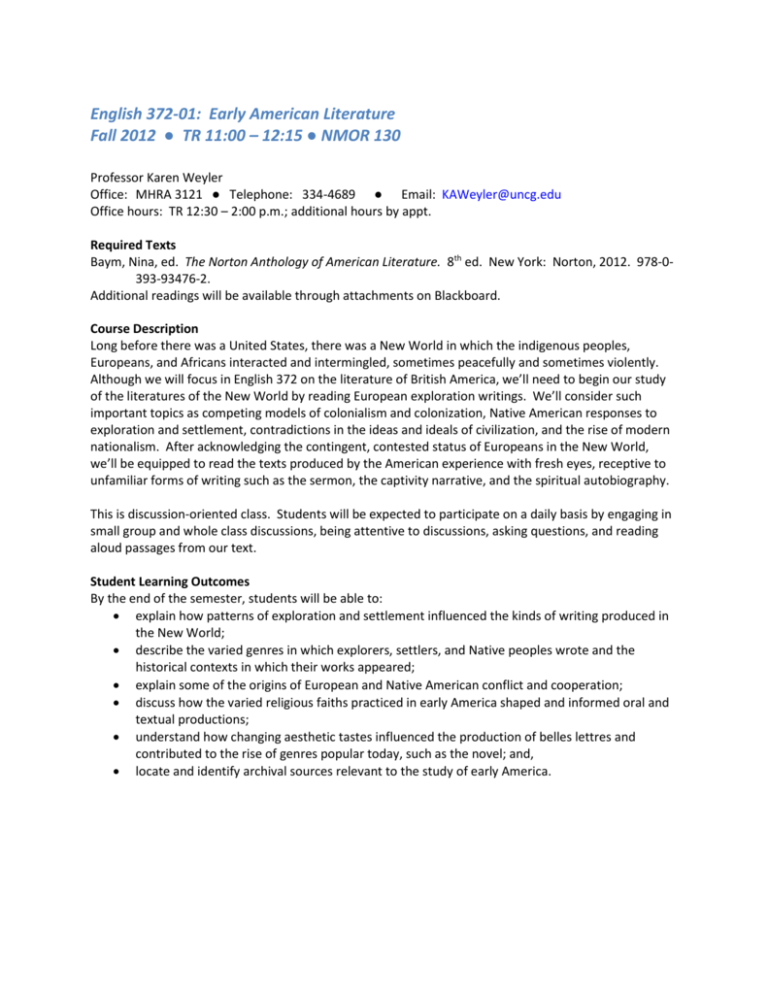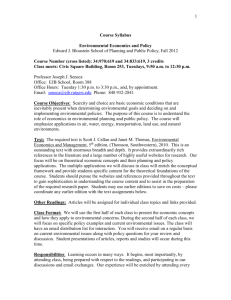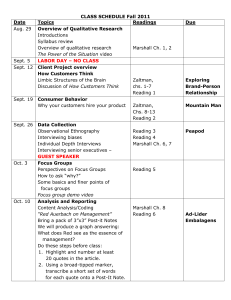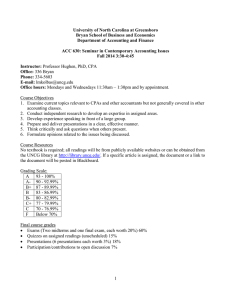372-01. K. Weyler
advertisement

English 372-01: Early American Literature Fall 2012 ● TR 11:00 – 12:15 ● NMOR 130 Professor Karen Weyler Office: MHRA 3121 ● Telephone: 334-4689 ● Email: KAWeyler@uncg.edu Office hours: TR 12:30 – 2:00 p.m.; additional hours by appt. Required Texts Baym, Nina, ed. The Norton Anthology of American Literature. 8th ed. New York: Norton, 2012. 978-0393-93476-2. Additional readings will be available through attachments on Blackboard. Course Description Long before there was a United States, there was a New World in which the indigenous peoples, Europeans, and Africans interacted and intermingled, sometimes peacefully and sometimes violently. Although we will focus in English 372 on the literature of British America, we’ll need to begin our study of the literatures of the New World by reading European exploration writings. We’ll consider such important topics as competing models of colonialism and colonization, Native American responses to exploration and settlement, contradictions in the ideas and ideals of civilization, and the rise of modern nationalism. After acknowledging the contingent, contested status of Europeans in the New World, we’ll be equipped to read the texts produced by the American experience with fresh eyes, receptive to unfamiliar forms of writing such as the sermon, the captivity narrative, and the spiritual autobiography. This is discussion-oriented class. Students will be expected to participate on a daily basis by engaging in small group and whole class discussions, being attentive to discussions, asking questions, and reading aloud passages from our text. Student Learning Outcomes By the end of the semester, students will be able to: explain how patterns of exploration and settlement influenced the kinds of writing produced in the New World; describe the varied genres in which explorers, settlers, and Native peoples wrote and the historical contexts in which their works appeared; explain some of the origins of European and Native American conflict and cooperation; discuss how the varied religious faiths practiced in early America shaped and informed oral and textual productions; understand how changing aesthetic tastes influenced the production of belles lettres and contributed to the rise of genres popular today, such as the novel; and, locate and identify archival sources relevant to the study of early America. Course Requirements and Evaluation You must complete and turn in all assignments in order to be eligible to pass this course. The final grade for this course will be based on the following: First examination 20% Second examination 20% Take-home final examination 10% Archival Assignment 15% Research Essay 25% Regular in-class quizzes and participation 10% Office Hours and Conferences You are welcome to visit my office at any point during the semester or to schedule an appointment outside of my usual office hours in order to discuss reading assignments, papers, etc. UNCG Writing Center The Writing Center (located at 3211 MHRA Building) is a wonderful resource, and I encourage you to visit it for assistance with your writing. For more information, call 334-3125. Accommodation for Disabilities If you would like to request accommodation for a disability that could affect your performance in this course, please contact the Office of Disability Services at 334-5440. Departmental List-serv If you would like to join the English Department listserv, send the following message to listproc@uncg.edu: Subscribe English-l yourfirstname yourlastname (note that is a lower case L, not the numeral 1, following English). Student Code of Conduct and the Academic Integrity Policy I expect every student to abide by the principles of the Student Code of Conduct and the Academic Integrity Policy, which may be found on line at http://academicintegrity.uncg.edu/complete/. Students will need to sign the Academic Integrity Pledge on all major work. In addition, you must always properly document any use of another's words, ideas, or research; unacknowledged use of someone else's thoughts is plagiarism. Work that is not properly documented will receive a zero; further penalties may be assessed according to the criteria established under the Academic Integrity Policy. If you have questions concerning documentation, please consult me. Selling class notes for commercial gain or purchasing such class notes in this or any other course at UNCG is a violation of the University’s Copyright Policy and of the Student Code of Conduct. Sharing notes for studying purposes, or borrowing notes to make up for absences, without commercial gain, are not violations. Use of any form of unauthorized electronic device (e.g. cell phone, mp3 player, etc.) during quizzes or exams will result in an automatic zero on the assignment. Attendance Policy Attendance is crucial to this class: Good discussions are its lifeblood. If you aren’t present, you can’t participate. Further, I will draw test and quiz questions not only from the assigned reading but also from 2 our discussions and additional material presented in class. Students who miss class frequently will be at a tremendous disadvantage on these assessments. As a matter of both courtesy and practicality, I expect students to arrive on time. Late arrivals are distracting and disrespectful to everyone. Students who are not present when roll is taken will be marked absent. If you are ill, you should certainly stay home; it is your obligation, however, to determine what you have missed and to make up any missed work promptly. Please be aware that quizzes and in-class writing assignments cannot be made up. Students will be allowed to make up missed work from excused absences only; arrangements must be made in advance of the absence and written documentation is required. Grounds for excused absence include such events as illness, death in the family, or religious holidays. Requests for excused absences for religious observance must be made at least one week in advance. Per university policy, students are limited to a maximum of two excused absences for religious observances; documentation is required, and any work that will be due during the absence must be submitted in advance. Seven or more absences, regardless of excuse, will result in a failing grade. Classroom Courtesy All of us are responsible for creating a productive, civil learning environment. I will give you 100% of my attention, and I expect the same in return. Especially in a large class, the ringing of phones and pagers, the click of texting, the presence of headsets, earbuds, and laptops open to Facebook and other such sites are disrespectful and distracting. Please turn off and put away all such devices when you enter our class. If you feel you really need to use a laptop, please discuss it with me privately. Ringing phones, texting, or the like may result in an immediate pop quiz for the entire class. On the other hand, if the class makes it through the entire semester without any such disruptions, you will be offered one of my exceedingly rare opportunities for extra credit. The opportunity is yours—but so is the responsibility to create a civil environment. If you are an emergency responder and need to be on call, please turn your electronic devices to vibrate and alert me. What Can You Expect from Your Professor? You can expect that I will treat you as an adult, encourage your participation in this class, listen carefully to what you have to say, and challenge your thinking. You can also expect me to evaluate your work fairly, offer constructive criticism and praise of your oral and written work, and return your work in a timely fashion. Electronic Resource: If you can’t remember what an allegory is, or if you can’t tell an allusion from an illusion, here’s an excellent (free!) online literary handbook for you: http://bcs.bedfordstmartins.com/litgloss/. 3 Course Calendar and Reading Assignments Please complete each day's readings before coming to class. Be sure to read the author introduction for each set of readings. You should always bring your book and printouts of any electronic readings to class. In case of inclement weather, you should be guided by UNCG's adverse weather policy. If classes are cancelled for any reason, please continue with the scheduled readings; I will notify you via Blackboard of any schedule adjustments. Tuesday Thursday Aug. 21 Course Introduction; Whitman’s “Prayer of Columbus” Aug. 23 Exploration and Cultural Exchange Intro, 3-7; 19-20; Columbus, letters 34-38; Las Casas, Brief Relation 39-42 Aug. 30 Champlain, Voyages 59-64; Radisson, Relation, pdf on BB Sept. 6 The English Colonies, South and North Smith, General History 83-92; A Description of New England 93-96 Sept. 13 Winthrop, A Model of Christian Charity 166-77 Sept. 20 Bradstreet, “The Prologue” 208-09; “In Honor of . . . Queen Elizabeth,” 209-13; “The Author to Her Book” 225; “Before the Birth of One of Her Children” 22526; “Upon the Burning of Our House “232-33 Sept. 27 Rowlandson, A Narrative of the Captivity and Restoration, 256-88 Aug. 28 Cabeza de Vaca, Relation 44-51 Sept. 4 Radisson, continued Sept. 11 Bradford, Of Plymouth Plantation 122-56 Sept. 18 Williams, The Bloody Tenet 204-206; A Letter to the Town of Providence 206; skim A Key 194-204 Sept. 25 Wigglesworth, The Day of Doom 239-55; Taylor, “Upon Wedlock and Death of Children” 303-04; “Huswifery” 305-06; “A Fig for Thee, Oh! Death” 306-07 Oct. 2 Rowlandson continued; Mather, The Wonders of the Invisible World 328-33 Archival Assignment due Oct. 9 First exam Oct. 16 No Class Meeting: UNCG Fall Break Oct. 23 Wheatley, “On Being Brought” 764; “To the Right Honourable” 765-66; “To the University of Cambridge,” 766; “On the Death of the Rev. Mr. George Whitefield” 767-68; Letter to Samson Occom 774 Oct. 30 Oct. 4 The Great Awakening “An Expanding World” 365-70; Edwards, “Personal Narrative” 398-409; Sinners 430-41; “Native Americans and Conflict” 442-43; Red Jacket, “Reply” 451-53 Oct. 11 No Class Meeting: Instructor at a conference Oct. 18 Woolman, Journal 597-604; Byrd, Secret Diary 391-96 Oct. 25 The American Revolution and the Creation of a National Culture “Imperial Politics” 370-78; Franklin, “The Way to Wealth” 457-63; “The Speech of Miss Polly Baker” 463-65; “Rules by Which a Great Empire May be Reduced to a Small One” 465-71 Nov. 1 4 Freneau, “To Sir Toby” 759-60; “On Mr. Paine’s Rights of Man” 760-61 Paine, The Crisis, No. 1 647-53 Topic for research essay due Nov. 6 Jefferson, Autobiography (The Declaration section) 661-67; Notes on the State of Virginia 668-77 Nov. 13 Tyler, The Contrast, Acts 2-5, 784-816 Nov. 20 Foster, The Coquette 824-880 Nov. 27 Foster, The Coquette 880-916 Research Essay due Dec. 4 Reading Day from The Federalist, No. 1, 679-81 and No. 10, 681-86 Nov. 8 Murray, “Desultory Thoughts” 739-47; be sure to look at “Keep within the Compass” on p. 738; Tyler, The Contrast, Act 1, 776-84 Nov. 15 Foster, The Coquette 818-24 Draft Workshop for Research Essay Nov. 22: No Class Meeting: Thanksgiving Break Nov. 29 Second Exam Dec. 6: Take Home Final Exam due by noon to MHRA 3121 5







